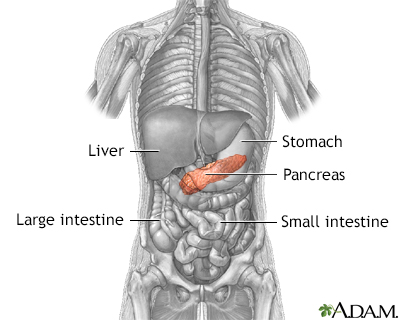VIPoma
VIPoma is a very rare cancer that usually grows from cells in the pancreas called islet cells.
Cancer
Cancer is the uncontrolled growth of abnormal cells in the body. Cancerous cells are also called malignant cells.

Causes
VIPoma causes cells in the pancreas to produce a high level of a hormone called vasoactive intestinal peptide (VIP). This hormone increases secretions from the intestines. It also relaxes some of the smooth muscles in the gastrointestinal system.
The exact cause of VIPomas is not known.
VIPomas are often diagnosed in adults, most commonly around age 50. Women are more likely to be affected than men. This cancer is rare. Each year, only about 1 in 1 million people are diagnosed with a VIPoma.
Symptoms
Symptoms of VIPoma may include any of the following:
- Abdominal pain and cramping
Abdominal pain
Abdominal pain is pain that you feel anywhere between your chest and groin. This is often referred to as the stomach region or belly.
 ImageRead Article Now Book Mark Article
ImageRead Article Now Book Mark Article - Diarrhea (watery, and often in large amounts)
- Dehydration
- Flushing or redness of the face
- Muscle cramps due to low blood potassium (hypokalemia)
- Nausea
- Weight loss
Exams and Tests
Your health care provider will perform a physical exam and ask about your medical history and symptoms.
Tests that may be done include:
- Blood chemistry tests (basic or comprehensive metabolic panel)
- CT scan of the abdomen
CT scan of the abdomen
An abdominal CT scan is an imaging test that uses x-rays to create cross-sectional pictures of the belly area. CT stands for computed tomography....
 ImageRead Article Now Book Mark Article
ImageRead Article Now Book Mark Article - Genetic tests
- MRI of the abdomen
MRI of the abdomen
An abdominal magnetic resonance imaging scan is an imaging test that uses powerful magnets and radio waves. The waves create pictures of the inside ...
 ImageRead Article Now Book Mark Article
ImageRead Article Now Book Mark Article - Stool exam for cause of diarrhea and electrolyte levels
- VIP level in the blood
Treatment
The first goal of treatment is to correct dehydration. Fluids are often given through a vein (intravenous fluids) to replace fluids lost through diarrhea.
The next goal is to slow the diarrhea. Medicines can help regulate diarrhea. One such medicine is octreotide. It is a manmade form of a natural hormone that blocks the action of VIP.
The best chance of a cure is surgery to remove the tumor. If the tumor has not spread to other organs, surgery can often cure the condition.
Support Groups
You can ease the stress of illness by joining a cancer support group. Sharing with others who have common experiences and problems can help you not feel alone.
Cancer support group
The following organizations are good resources for information on cancer:American Cancer Society. Support and online communities. www. cancer. org/...
Read Article Now Book Mark ArticleOutlook (Prognosis)
Surgery can usually cure VIPomas. But, in one third to one half of people, the tumor has spread by the time of diagnosis and cannot be cured. However, it grows fairly slowly, and its effects often can be regulated by octreotide.
Possible Complications
Complications may include:
- Cancer spread (metastases)
- Cardiac arrest from low blood potassium level
- Dehydration
When to Contact a Medical Professional
If you have watery diarrhea for more than 2 to 3 days, contact your provider.
Reviewed By
Sandeep K. Dhaliwal, MD, board-certified in Diabetes, Endocrinology, and Metabolism, Springfield, VA. Also reviewed by David C. Dugdale, MD, Medical Director, Brenda Conaway, Editorial Director, and the A.D.A.M. Editorial team.
Asban A, Patel AJ, Reddy S, Wang T, Balentine CJ, Chen H. Cancer of the endocrine system. In: Niederhuber JE, Armitage JO, Kastan MB, Doroshow JH, Tepper JE, eds. Abeloff's Clinical Oncology. 6th ed. Philadelphia, PA: Elsevier; 2020:chap 68.
De Herder WW, Feelders RA, Hofland J. Neuroendocrine tumors and disorders. In: Melmed S, Auchus RJ, Goldfine AB, Rosen CJ, Kopp PA, eds. Williams Textbook of Endocrinology. 15th ed. Philadelphia, PA: Elsevier; 2025:chap 43.
National Cancer Institute website. Pancreatic neuroendocrine tumors (islet cell tumors) treatment (PDQ) - health professional version. www.cancer.gov/types/pancreatic/hp/pnet-treatment-pdq. Updated August 16, 2024. Accessed October 15, 2024.
Disclaimer
© 1997- A.D.A.M., a business unit of Ebix, Inc. Any duplication or distribution of the information contained herein is strictly prohibited.




